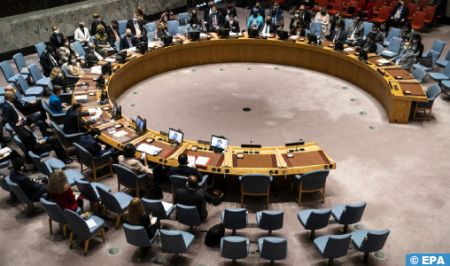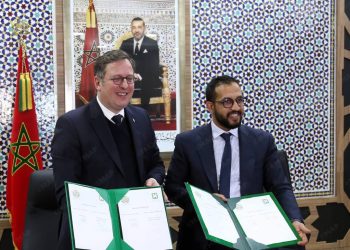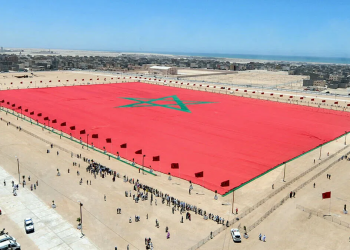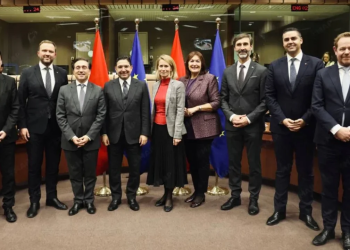The UN Security Council has held closed-door consultations in New York on the Moroccan Sahara issue.
According to diplomatic sources in New York, the Council’s members were briefed Monday by the Personal Envoy of the UN Secretary-General for the Sahara, Staffan de Mistura, as well as the Personal Representative of the Secretary-General and head of MINURSO, Alexander Ivanko.
These consultations take place with a view to adopt, at the end of October, a resolution extending MINURSO’s mandate, for which the UN Secretary-General, Antonio Guterres, has recommended a period of one year.
During these consultations, the two UN officials briefed the members of the Security Council on the basis of the latest report of the UN chief on the Moroccan Sahara issue, in which Mr. Guterres slammed in particular the repeated violations and constraints of the “Polisario” to freedom of movement and to the operational and logistical activities of MINURSO.
He also reported the deterioration of the human rights situation in the Tindouf camps in Algeria and the continuation of abuses, violations and exploitation by “polisario” of the rights of the populations held against their will in these camps, in particular the right to free expression and movement.
UN Secretary-General also reaffirmed in his report the fundamentals of the UN political process, as recommended by the Security Council in all its resolutions since 2018, stressing that a solution to this conflict is possible provided that “all the parties concerned”, particularly Algeria, engage in good faith, with realism and in a spirit of compromise, in the facilitation effort led by its Personal Envoy and in the continuity of the roundtable dynamics initiated by his predecessor.
Well-informed and concordant diplomatic sources at the UN said that, during these consultations, Mr. de Mistura referred to his visit, at the invitation of Morocco, to Laâyoune and Dakhla, in the Saharan provinces of the Kingdom, on September 5-7.
During this visit, the UN official met with local elected officials, dignitaries and sheikhs of the Sahrawi tribes, who expressed their unwavering attachment to the Moroccanness of the Sahara and their support for the Moroccan autonomy initiative, within the framework of the national sovereignty and the territorial integrity of the Kingdom.
During this trip, Mr. de Mistura was able to appreciate local democracy in the southern provinces, where the population elects, by universal suffrage and with a voter turnout that exceeds the national average, their representatives both at the level of the national Parliament and the regional and municipal authorities.
The Personal Envoy of the UN Secretary General also briefed the members of the Council on the dynamic of great development that he observed first-hand, and which the southern provinces have experienced since their return to the homeland, as well as the tranquility which prevails in these provinces, in addition to major infrastructures which have been built to promote the economic, social, cultural and environmental development of the Sahara, within the framework of the new development model of the southern provinces.
Several members of the Council also welcomed the huge efforts made by Morocco in this regard and which transformed the Moroccan Sahara into one of the most prosperous regions not only at the national level but also at the regional and continental levels.
According to the same sources, a large number of countries expressed, during these consultations, their support for the Moroccan autonomy initiative, noting that this plan represents the serious and credible basis that can end the regional dispute over the Moroccan Sahara, as enshrined in Security Council resolutions since 2007.
They unanimously supported the UN political process aimed at achieving a political, realistic, pragmatic, lasting and compromise solution to the Moroccan Sahara issue, on the exclusive basis of Security Council resolutions adopted since 2007, particularly Resolution n° 2654 of October 2022, confirming once again, if it was still necessary, the definitive burial of the referendum.
In this regard, they reaffirmed their support for the efforts of the Personal Envoy of the UN Secretary General aimed at relaunching the UN political process. A strong and frank call was launched for the resumption, as soon as possible, of the roundtable process, which Algeria still continues to reject, ignoring the calls of the international community for a final political settlement of this regional dispute over the Moroccan Sahara.
The role of Algeria as the main party to this dispute was also highlighted during these consultations.
The members of the Security Council also highlighted the close cooperation between the Moroccan authorities and MINURSO, as confirmed in Mr. Guterres’ latest report.
Likewise, they expressed serious concern over the withdrawal by the “polisario” of the ceasefire, its violations of military agreements, and its obstruction of MINURSO’s activities and the freedom of movement of its military observers.
They urged “Polisario” to respect the ceasefire, to refrain from any provocative act and to end its dangerous obstacles to the implementation of MINURSO’s ceasefire supervision mandate, in particular by blocking its patrols and preventing the resupply of military observers.
According to the same sources, several countries have highlighted the stability and peace which prevail in the southern provinces, refuting the fallacious allegations of Algeria and its “Polisario” puppet about an alleged conflict in the Moroccan Sahara.
MAP: 17 October 2023








